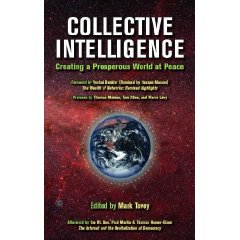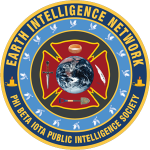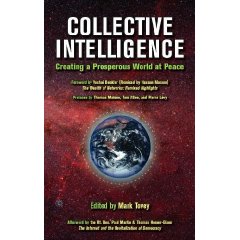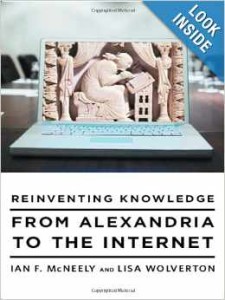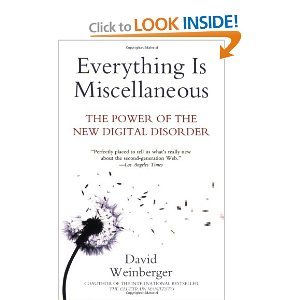
Valuable Overview, June 25, 2008
David Weinberger
I totally disagree with the reviewers that pontificate against this book. It is not a techno-geek book, or a philosophy book, it is simply a common sense overview that I personally consider to be educated, helpful to the point of essential. At $16, with the Amazon discount, this book is a bargain.
I started with the index, and immediately discovered Meta-Data had 18 lines.
The book opens with examples from Staples (“hacking the physical”) to Apple iTunes (end of bundling) and I am immediately charmed by the combination of an end to fraudulent store organization (Giant supermarket moves everything from one week to the next to force searching which increases impulse buying) and an increase in focus on serving the individual rather than serving up a “one size fits all” solution. Separately I am looking at Chinese medicine for a health intelligence book, and this resonates.
Early on one sees the author agreeing with Jean Francois Noubel (the end of the pyramidal organization) and Jim Rough (rise of the circle of citizen wisdom)–I myself enraged the secret intelligence mandarins by announcing in the 1990's that “in the age of decentralized information central intelligence is an oxymoron.” The author is one of the gurus of what is becoming known as the axis of Cognitive Science and Collective Intelligence (the Art), and he and another 54 authors are brought together in the first collective work of its kind, Collective Intelligence: Creating a Prosperous World at Peace which is also free online in full pdf or chapter docs. Disclosure: I published the book–I do not know the author personally, but Jock Gill, a gifted communicator, exposed me to the author's earlier work on Open Spectrum, something that inspired my own informal views on “Open Everything” and unlike most of the other contributors that were identified by Tom Atlee or Mark Tovey (the editor), I personally sought his contribution to the book because of my very high regard for his “take” on all this.
I bought the book as a fan already, but the content easily validates my appreciation The discussion of first order pigeon-holing (the Weberian concept of bureaucracy applies), second order cross referencing (naturally limited and often wrong in early generations–Library of Congress and Dewey Decimal System are toast), versus unlimited tagging, chunking, clustering, socially-informed selection, and other aspects of the power of the collective, are all illuminated by this book.
I am further impressed early on with his stellar discussion of Mortimer Adler and the limitations of alphabetization. I was a penniless graduate student when I discovered the Great Books, and as a young officer, spent my first $700 acquiring a set. The Syntopicon that the author mentions in the book is better understood by the image I introduce above, something I created in 1979, my second of four analytic models (the first was on predicting revolution across all domains).
I have two notes at this point:
1) Truth or what can be known constantly changing, a fixed or slow to adapt “index” process cannot scale or survive.
2) 2008 election is already lost–neither candidate offers us what we deserve: listening instead of stump speeches; appointed cabinet and balanced budget now, as part of the campaign, instead of empty promises; and 24/7 interaction with all 65 political parties, instead of focusing on the one third that is their base and a slice of the middle third.
He emphasizes that knowledge is not top down, and with a tip of the hat to Kirkpatrick Sale, author of Human Scale and also facilitator for the nation-wide network of 27 separatist movements, I also post above an image of Epoch B “bottom up” leadership that none of our world leaders understand.
Page 80, discussion of Ranganathan (India) Colon Classification system impresses me. I think to myself, wow, needs to be integrated into Pierre Levy's Information Economy Meta Language, or IEML.
The middle of the book discusses–engagingly, I feel–how the digital world enables infinite variations in relationships and labels that can in turn create infinite variations of just right, just in time, just enough visualizations.
Crowd tagging leads to sub-set clustering which leads to contextual sense-making.
He spend time on Wikipedia. I admire Jimbo Wales and try to attend the Wikimanias, but I have given up on Wikipedia because in the case of the Open Source Intelligence (OSINT) page, I had to give up–while the author would have me engage and patiently lead the recalcitrant along (I have 20 years experience with that in the real world) I have come to a different conclusion: I believe that anyone should be allowed to CREATE, but only master moderators should be allowed to destroy.
The summary of the book's message is offered by the author with four concepts:
1) Filter on the way OUT, not in (this is the difference between the read only publishing model, and the read-write Creative Commons model)
2) Put each leaf on as many branches as possible–unlike the physical world, each leaf can have infinite lives
3) Everything is meta data and everything can be a label (he provides a fine discussion of bar codes, RFIDs, and Thinglinks)
4) Give up control. He admires Wikipedia for doing precisely that. When I first started the modern OSINT movement in 1992, I coined the phrase, “Give up control to gain control” meaning that centralized intelligence had to give way to decentralized sharing and sense-making. The spies still don't get it, but public intelligence in the public interest is here to stay. A corollary here is that the best approach is to include all–optimize inclusiveness and diversity; and where there is conflict or disagreement, postpone exclusion or resolution, more data later will make it easier and easier to come back to…
The final section of the book deals with mapping the implicit, mining the clouds of tags, creating an infrastructure of meaning with infinite potential. I have a note: unites the eight tribes of intelligence (governmenbt, military, law enforcement, academia, business, media, non-profits, and civil societies including religions and labor unions).
Other flyleaf notes:
+ Stupid works. Keep it simple and let it evolve on its own.
+ Bit by bit, not all at once. Provide for innovation at the intersections and on the margins
+ Kind of and sort of rule, not the black and white that did rule
+ I learn of Valdis Krebs and his concepts of social cartography
+ I am engaged with the discussion of information sprawl and natural typologies
+ The author concludes that the search for knowledge will constantly struggle between the simple and the complex (sources and methods).
+ Going meta is what is so cool about web ecology and evolution.
The author does NOT say this, but I mark his book down as being in favor of the human web of sense-making beating out the semantic web and machine learning schools.
Page 230, this is a quote that really grabs my attention: “It's not about who is right and who is wrong. It's how different points of view are negotiated, given context, and embodied with passion and interest. Individual thinking out-loud now have weight, and authority and expertise are losing some of their gravity.” The rest of this page is equally good.
I am surprised to learn that the author holds a PhD in philosophy, and that he advised Howard Dean. I am not surprised to learn that he has been twice renewed as a fellow at the Berkman Center.
Other books that have engaged me and for which I have reviews:
The World Cafe: Shaping Our Futures Through Conversations That Matter
The Tao of Democracy: Using Co-Intelligence to Create a World That Works for All
The Cultural Creatives: How 50 Million People Are Changing the World
One from Many: VISA and the Rise of Chaordic Organization
Groundswell: Winning in a World Transformed by Social Technologies
Here Comes Everybody: The Power of Organizing Without Organizations
Society's Breakthrough!: Releasing Essential Wisdom and Virtue in All the People
How to Change the World: Social Entrepreneurs and the Power of New Ideas, Updated Edition
There are many others, most obvious. Please do see the two images I post above–I firmly believe that the last eight years were a gift from heaven, a necessarily catastrophic gutting of our Nation so that we might properly conclude that both political parties stink with corruption, and it is time we put We the People back into the Republic, 24/7. This book is a solid brick in our foundation for understanding why this is both possible, and necessary.


